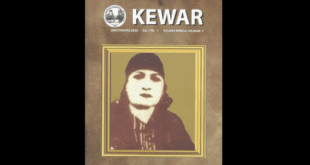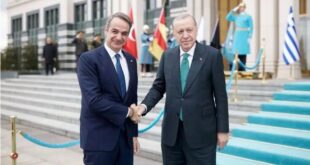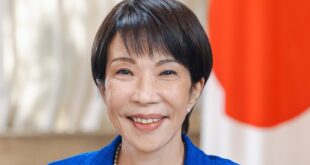In our context, it is fundamental to say that in Euskal Herria we do not have our own state, so we cannot develop as much as we want the linguistic policy necessary to revitalize a language. We always depend on the Spanish or French states. Our language is a secondary language compared to the hegemonic languages.
Xabier Lertxundi Asteasuinzarra is the mayor of Hernani from EH Bildu. Hernani is a small city near San Sebastian, the capital city of Gipuzkoa Province of Basque Country. Hernani is well known for its success in the field of language revitalization efforts which have been carried out by the municipality and local actors. Editor of Infowelat Necat Ayaz has done an interview with Lertxundi Asteasuinzarra to bring the Basque language normalization process to the attention of the Kurdish municipalities and the Kurdish people.
Hernani is one of the municipalities implementing a language planning policy for the normalization of Basque. Why does your municipality actively engage in revitalization efforts? What is the importance of preserving Euskara at the local level?
From the Hernani City Council, we believe that the Basque language is a fundamental part of our town. Without the Basque language, we would not be the people we are. We live in a nation divided between the Spanish and French states, where our language coexists in a situation of diglossia with two dominant languages. If we did not work actively, our language would disappear. It is necessary to have a plan that actively works toward the normalization of minority languages.
Working at the local level seems to me to be very important, since in the end it is the level we live at on a daily basis. We, the city councils, are the institutions that are closest to the citizens, the ones that have the greatest influence on people’s daily lives. I understand that this is also key for language policies. By saying that I do not mean that the higher institutions do not have responsibilities. They do, and very much so. It is essential to have joint efforts from all public institutions at different levels, along with social representatives.
Can you provide some information about the language planning process in your municipality? Who are the key actors involved in this process?
The Basque Language Service was established in 1989 and has performed two main functions. One of them is Euskaldunization of the City Council itself. A normalization technician works for this function. The other is to influence the normalization of the Basque language within the municipality.
Since then, several projects have been carried out to promote and normalize the Basque language in the municipality. In 2021, a reflection process was initiated with people from various socioeconomic and cultural backgrounds who are concerned about the Basque language in the municipality. The aim was to reflect on the work done over the years by the Basque Language Service of the City Council, assess the current situation of the Basque language, and determine future actions. This resulted in a report titled “Normalization of the Basque Language in Hernani: How to Move Forward.”
Once the reflection process was completed, the drafting of a plan began. This plan was developed in collaboration with the key stakeholders working on the Basque language in the municipality: schools, the Dobera association in favor of the Basque language, Euskaltegi AEK (adult literacy coordinator) and leisure time groups. The Plan established the following priority lines in family transmission., Euskaldunization of society, leisure, migration, demographic, urban development and language.
The City Council approved in September 2023 the Basque language plan for the period 2023-2024.
The actors of this plan are the Basque Language Council, which consists of the City Council and various municipal representatives. The Participants of the plan are representatives from key sectors including the City Council, educational institutions, sports organizations, recreational groups, AMHER (Multicultural Association of Hernani), advocates for the Basque language, adult literacy programs in Basque (Euskaltegi), the BERRIAK commercial association, and UEMA (Commonwealth of Basque Municipalities).
And the objectives of this plan are to carry out and reach a consensus on contributions to the annual management plan for the development of the Basque Language Plan and to elaborate proposals for the standardization of the Basque language.
When did you begin to implement the initial language plans in Hernani, and what progress have you made thus far in terms of language revitalization?

Since the establishment of the Basque Language Service, numerous initiatives have been undertaken to foster and normalize the Basque language within the municipality. These endeavors encompass a variety of specific and ongoing projects spanning various sectors of society, including leisure, education, socioeconomic development, and culture.
The first long-term vision plan was approved in 2023. The City Council has managed to operate almost entirely in Basque today. The statistics reflect not only the influence of the town council but also the collective efforts of various representatives. Before 3 out of 5 in 1986 studied in Castilian in the town and 2 out of 5 studied in Basque. In 2023 almost 5 out of 5 studied in Basque (few exceptions in Vocational Training). In 1986, 44% were Basque speakers, 20% were able to understand it and 36% neither spoke nor understood it. In 2021, 61% were Basque speakers, 15.9% understand it, and 22.8% neither speak nor understand it. The use of Basque in the street in 2001 was 27.2%; and in 2021 it was 33.3%.
To round up all this, it is necessary to point out that the processes are participatory, that it is essential to engage various representatives from the outset in the normalization process.
Throughout the preparation and implementation of the plans, have you encountered any challenges from the Spanish state or political entities within the Basque Country, which are typically labeled as ‘espanyolist’?
We can say that at the local level the political parties that are represented in the Hernani City Council demonstrate a high degree of agreement, although the commitment is not the same in all cases. At other levels there are difficulties. At this moment we are living the judicialization of the Basque language normalization processes. Although in this part of the Basque Country there was a broad agreement so that the city councils could work in Basque, the judiciary suspended the articles of laws that make reference to that; or it is suspending the linguistic requirements (the need to have a level of Basque) that we demand in the public administration to the people who are going to work in it. We believe that in order to respect the linguistic rights of all people (an obligation that the administration has) those who are going to work or be public representatives in them, have to know Euskara. There is a clear attack against Euskara and against the Basque people from “espanyolist”.
What can you say about attitude of people towards their language and efforts for language planning?
Nowadays, in Hernani and also in Euskal Herria in general, except in Navarra, people are in favor of Basque, there are very few who oppose the promotion of Basque. As far as effort is concerned, when sociolinguistic indicators are analyzed in the Basque Country, knowledge, use and attitude are especially analyzed, and the data on knowledge are much higher than the data on use. This has created the belief that adherence to the language is small, but in reality, most of those who know Basque have studied it at school, but they get along much better in Spanish. The latest research has shown that, if we analyze the knowledge data in terms of ease, the existing use is very high compared to what was expected. This shows a positive attitude towards Basque in general.

The aim of language revitalization is to make the language indispensable, spoken in all aspects of daily life within its region. Do you believe you’ve been successful in reaching this goal?
The objective of linguistic recovery is to extend the Basque language to all areas of society and to ensure its transmission. In the town, in addition to Basque and Spanish, more and more languages are spoken: the objective is for Basque to be the axis and give cohesion to society, without having to renounce one’s own language.
Success is relative: Spanish continues to be central in everyday use, but in some areas Basque is making progress. The clearest examples are the city council and education, but steps have also been taken in other areas: sports, culture…
However, the feeling is that we are in a stagnation; it is not possible to transfer the progress in the competence in Basque to the use. There are sociolinguistic reasons for this to happen, and the research that has been carried out lately on the Basque language is analyzing it and how to turn it around.
In our context, it is fundamental to say that in Euskal Herria we do not have our own state, so we cannot develop as much as we want the linguistic policy necessary to revitalize a language. We always depend on the Spanish or French states. Our language is a secondary language compared to the hegemonic languages. And we cannot forget that Basque is a minority language and is in danger of extinction. In municipalities like ours, in the Basque-speaking municipalities, the situation is better, and that is why we say that in the process of normalization of the Basque language, these municipalities, which will be the model for the revitalization of the Basque language, are of special importance.
Following the local elections on March 31st, the Kurdish DEM Party secured victory in 75 municipalities across Kurdistan. Prior to the election, candidates pledged to safeguard the Kurdish language if elected. Drawing from the Basque experience, do you have any recommendations for Kurdish mayors?
The primary challenges revolve around legal constraints and the level of commitment from the citizens towards the language. If the community demonstrates strong adherence, it can help alleviate some legal hurdles and propel progress. Regarding the City Council, it’s imperative to prioritize the language and recognize that its vitality is often shaped by policies across various departments, not just the language-specific ones. Language is the way for people to relate to each other and this is influenced by territorial organization, urban planning, culture and so on. Therefore, I would recommend that they place language at the forefront and adopt a holistic approach. However, the most crucial suggestion is for the mayor and public representatives to lead by example. The public representatives are people of reference, so they must embody the essence of Kurdish language and culture in the eyes of the citizens.
————————————–
Cover photo: Xabier Lertxundi Asteasuinzarra/ Photo used with permission
 Infowelat Enformasyon Ji Bo Welat
Infowelat Enformasyon Ji Bo Welat




